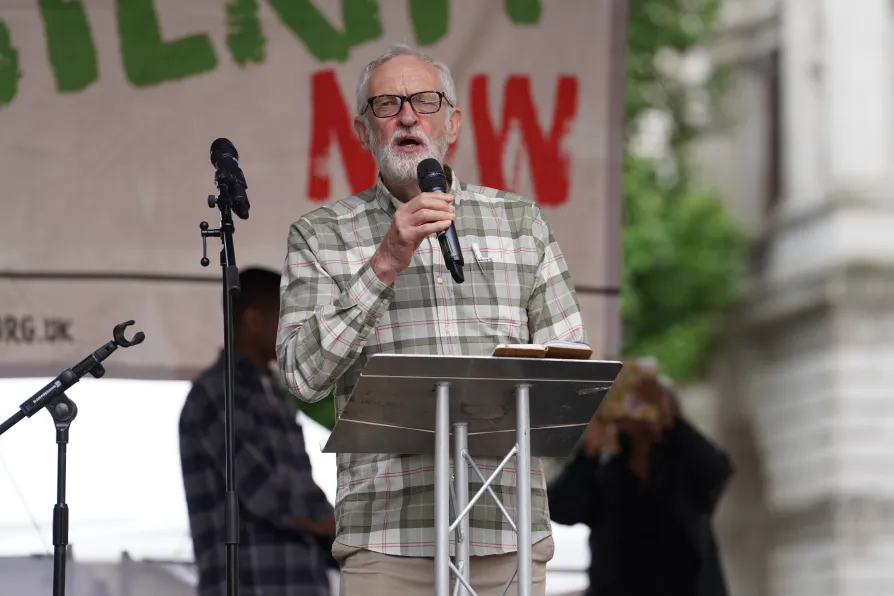
 Former Labour Party leader Jeremy Corbyn speaking at the People's Assembly Against Austerity protest in central London, June 7, 2025
Former Labour Party leader Jeremy Corbyn speaking at the People's Assembly Against Austerity protest in central London, June 7, 2025
A NEW left political party could secure 10 per cent of the vote, according to an opinion poll published this week, a move that could force a rethink of Prime Minister Sir Keir Starmer’s floundering political strategy.
Pollsters More in Common found that a presently non-existent “new Corbyn-led party” would primarily take votes from both Labour and the Greens.
With the new party factored in, Reform would lead on 27 per cent, with Labour and the Tories on 20 per cent each, the Lib Dems on 14, Greens on 5 and the Scottish National Party on 2 per cent.
Without the new party, Labour would poll 23 per cent, the Greens 9 per cent, and the SNP 3, with the other parties’ vote share unchanged.
Discussions about launching such a party have been continuing for months. It would have at its parliamentary core MP Jeremy Corbyn and the four pro-Gaza independent MPs elected last year.
The Mail on Sunday newspaper reported that suspended Labour MP Zarah Sultana may be involved in leading the party, although she herself has made no statement regarding her participation.
There is no sign of Labour restoring the whip to one of the government’s most trenchant left critics in the Commons.
Mr Corbyn himself believes the time has now come for a new party. He recently told a rally in Liverpool that “I am determined there will be, in a short time, a strong alternative democratic socialist, left-wing voice that brings people together.”
How to give effect to this intention has become a fraught process, with contending perspectives and clashing personalities unmediated by an effective point of leadership.
Two separate groups had been working on plans to launch a party, with Mr Corbyn engaged with both.
One, Collective, was launched 18 months ago by Karie Murphy, chief of staff to Mr Corbyn when he was Labour leader, and others; the second has sought to bring together MPs and some of the candidates who made an impact in the last general election.
The two groups have recently combined, although this has yet to yield a unified way forward. Those aligned with Collective are pushing for an early launch of a new party with Mr Corbyn as its interim leader, supported by deputies.
Others, enthused by the prospect of Ms Sultana’s involvement if that proves to be her intention, favour a joint leadership and the start of a generational leadership shift for the left.
Both agree, however, that any leadership decision can only be provisional pending the development of democratic structures allowing the membership a decisive say.
While the new venture would need to register with the Electoral Commission as a party, there are differing views on whether it should be structured as an alliance of local and other initiatives or as a more formal party.
Relations with the Greens, currently in the throes of a consequential leadership election, is another question — the poll shows that the two organisations could significantly cannibalise each other’s votes.
The poll will doubtless concentrate minds both among those involved and in a Downing Street increasingly beleaguered on all sides.
It is challenging to translate vote share into seat outcomes, particularly four years out from the likely date of the next general election, but at least 30 seats have been targeted as winnable by a new party.
This would force Sir Keir’s strategist Morgan McSweeney to fight on two fronts. Currently, he is focused exclusively on winning over the very small number of Reform and Tory voters who might be persuaded to switch to Labour, a strategy that informs government policy on everything from migration to arms spending and is driven by his hatred of the left in all forms.
A new left party would hope to attract those millions who voted for Labour under Mr Corbyn in 2017 but have since abandoned Sir Keir’s party.
In alliance with the Greens, it would mean five-party politics in England, and six in Scotland and Wales, meaning that in many constituencies, almost anyone could win under first-past-the-post rules.

Every Starmer boast about removing asylum-seekers probably wins Reform another seat while Labour loses more voters to Lib Dems, Greens and nationalists than to the far right — the disaster facing Labour is the leadership’s fault, writes DIANE ABBOTT MP

The suspended Labour MP’s historic resignation to found a working-class party has lit up social media with excitement as thousands knock at the door wanting involvement in the desperately needed project, writes ANDREW BURGIN











